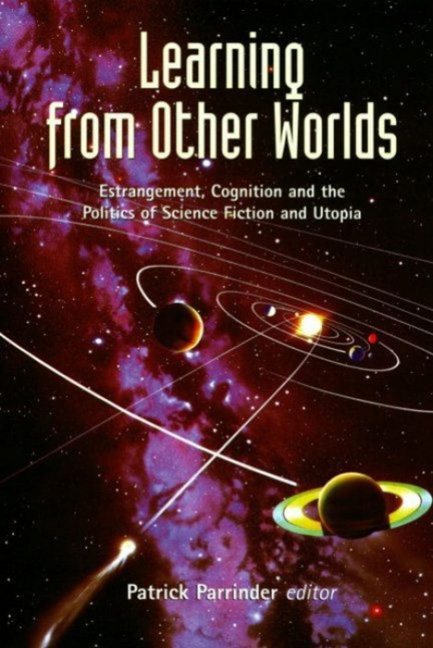Book contents
- Frontmatter
- Contents
- Acknowledgements
- Contributors
- Introduction: Learning from Other Worlds
- Part I Science Fiction and Utopia: Theory and Politics
- Part II Science Fiction in its Social, Cultural and Philosophical Contexts
- From the Images of Science to Science Fiction
- Estranged Invaders: The War of the Worlds
- ‘A part of the … family [?]’: John Wyndham's The Midwich Cuckoos as Estranged Autobiography
- Labyrinth, Double and Mask in the Science Fiction of Stanislaw Lem
- ‘We're at the start of a new ball game and that's why we're all real nervous’: Or, Cloning—Technological Cognition Reflects Estrangement from Women
- ‘If I find one good city I will spare the man’: Realism and Utopia in Kim Stanley Robinson's Mars Trilogy
- Afterword: With Sober, Estranged Eyes
- Darko Suvin: Checklist of Printed Items that Concern Science Fiction (with Utopian Fiction or Utopianism, and a Few Bordering Items)
- Bibliography
- Index
Estranged Invaders: The War of the Worlds
from Part II - Science Fiction in its Social, Cultural and Philosophical Contexts
- Frontmatter
- Contents
- Acknowledgements
- Contributors
- Introduction: Learning from Other Worlds
- Part I Science Fiction and Utopia: Theory and Politics
- Part II Science Fiction in its Social, Cultural and Philosophical Contexts
- From the Images of Science to Science Fiction
- Estranged Invaders: The War of the Worlds
- ‘A part of the … family [?]’: John Wyndham's The Midwich Cuckoos as Estranged Autobiography
- Labyrinth, Double and Mask in the Science Fiction of Stanislaw Lem
- ‘We're at the start of a new ball game and that's why we're all real nervous’: Or, Cloning—Technological Cognition Reflects Estrangement from Women
- ‘If I find one good city I will spare the man’: Realism and Utopia in Kim Stanley Robinson's Mars Trilogy
- Afterword: With Sober, Estranged Eyes
- Darko Suvin: Checklist of Printed Items that Concern Science Fiction (with Utopian Fiction or Utopianism, and a Few Bordering Items)
- Bibliography
- Index
Summary
SF is, then, a literary genre whose necessary and sufficient conditions are the presence and interaction of estrangement and cognition, and whose main formal device is an imaginative framework alternative to the author's empirical environment.
Suvin, Metamorphoses, pp. 7–8In my own reading and teaching of science fiction I have always been fascinated by scenes of ‘First Contact’, the moment of encounter between humans and aliens, a moment familiar to us from anthropological investigation and historical accounts; one which, consciously or not, re-enacts the encounters of the European ‘discovery’ of the New World. SF accounts of meetings with alien others have usually been modelled on the European narratives of voyages of discovery of the sixteenth and seventeenth centuries. Yet in the earliest voyages to the Moon and the planets (from Cyrano to Voltaire) the alien appears primarily in a satirical role. Interest in the physical appearance and being of the alien comes later, with speculation about the possibility of life on other worlds. The first major literary text in which the alien becomes interesting for its own sake is H. G. Wells's The War of the Worlds (1898), which establishes the portrayal of aliens in SF for decades to come.
Science fiction often tries to imagine such meetings ‘innocently’, without the greed and acquisitiveness which motivated the European voyages of discovery. SF has another hypothetical advantage. While there are, of course, historical accounts of the discovery of the New World from the perspective of those who were discovered as well as from that of the European discoverer, accounts of the converse of this event—the discovery of Europe—exist primarily in fiction. The discovery of Europe by representatives of other cultures has been used as a satirical literary device (as in Montesquieu's Lettres persanes, or Voltaire's Micromégas), but there is no equivalent to the devastation and plundering of the New World by someone claiming to have discovered Europe. In SF, however, there are no such limitations: narratives of visits to Earth by aliens are as common as those which tell of voyages to other worlds.
With Wells the representation of the alien marks a shift from more explicitly didactic works (utopia, social satire etc.) to more pleasurable forms of fiction.
- Type
- Chapter
- Information
- Learning from Other WorldsEstrangement, Cognition, and the Politics of Science Fiction and Utopia, pp. 127 - 145Publisher: Liverpool University PressPrint publication year: 2000

